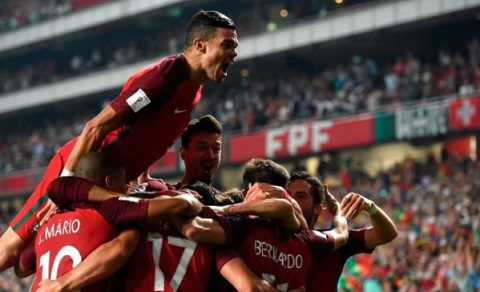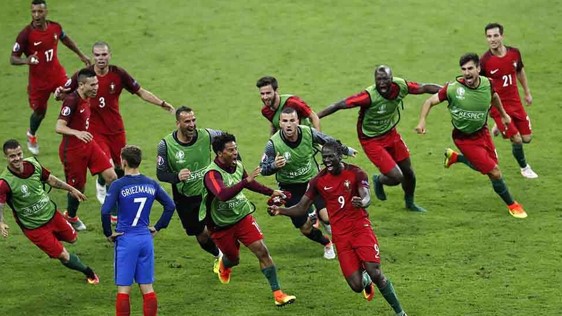 In the late 19th century football started gaining popularity in Portugal. Students returning from England introduced this game to the locals. At that stage no-one could imagine that a small nation new to the what would become world’s sport could become champions of Europe. In 1875, the first organised match of football took place in Portugal, and since then the sport has become by far the most popular sport in the country.
In the late 19th century football started gaining popularity in Portugal. Students returning from England introduced this game to the locals. At that stage no-one could imagine that a small nation new to the what would become world’s sport could become champions of Europe. In 1875, the first organised match of football took place in Portugal, and since then the sport has become by far the most popular sport in the country.
Even if you are not a football enthusiast, you probably know Ronaldo, the most iconic football player from Portugal. Well, Ronaldo is not the only elite footballer produced by Portugal. The country has competed well in World Cups and European Championships, especially in the current century, culminating in triumph at Euro 2016.
Many top players from Portugal are playing in the biggest football clubs all around the world. Football has a rich history in Portugal. This article will discuss some of the most important points that every football enthusiast should know.
Evolution of football in Portugal
In the early days, different local clubs used to play friendly matches. After some time, several organisations started setting up tournaments and events at regional and national levels. In the 20th century, there were many local clubs playing at the national level. Now, something was needed to determine the best club in the country. The “Campeonato de Portugal” was born at the national level, and the country’s top football clubs took part in this event.
To date, five clubs have become national champions: Benfica, Porto, Sporting, Belenenses and Boavista.
International club success
Over the years, different football clubs from Portugal have won eleven international trophies:
- European Cup/UEFA Champions League (4 trophies)
- UEFA Cup/UEFA Europa League (2 trophies)
- European Cup Winners’ Cup
- UEFA Intertoto Cup
- UEFA Super Cup
- Intercontinental Cup/Toyota Cup (2 trophies)
Portuguese superstar footballers
Over the years, Portugal has produced some of the most popular and successful players in the entire football world. Eusébio, Luís Figo and Cristiano Ronaldo all won the coveted Ballon D’Or trophy, crowning the best football in the world in a calendar year.
The likes of Seleção star players Fernando Peyroteo, Fernando Chalana, Paulo Futre, Rui Costa, Deco and Pepe, to name just a few, can also be considered among the best ever footballers in their respective positions.
African influence
 Portugal was one of the first European nations teams to explore Africa for football talent. The increase in the popularity of football was obvious in Mozambique, Angola and Guinea-Bissau especially, which would provide the Seleção with a rich source of brilliant footballers.
Portugal was one of the first European nations teams to explore Africa for football talent. The increase in the popularity of football was obvious in Mozambique, Angola and Guinea-Bissau especially, which would provide the Seleção with a rich source of brilliant footballers.
Eusébio and Mário Coluna, both from Mozambique, were voted into the team of the tournament at the 1966 World Cup for their performances in a Portugal shirt, and the man who scored the most important goal in Portuguese football history, Éder, was born in Guinea-Bissau.
Many Africans from the former Portuguese colonies enthusiastically support Portuguese club teams and even the national team, given the many players of African origin who have played for the Seleção.
Growth of the Entertainment Industry
Widespread access to new technologies has made things more accessible for the common man. From watching national and international matches to playing football, interest in the sport has continued to develop over time.
Casinos also adapted to the digital revolution, and Portuguese gamers started joining online casinos. Now, there are many options available for darmowe spiny bez depozytu za rejestrację where players can get started instantly. If you have wanted to visit international events but do not have the funds, play casino games online. With a little luck can make yourself financially independent to enjoy the possibility of travelling to games abroad.
The popularity of football in the country
What makes football so popular in Portugal?
A proud and age-old nation, football gained popularity in Portuguese culture right from the moment it was introduced in the 19th century. In 2023, football is considered one of the most important aspects of the local culture. Hundreds of clubs have been established all over the country, offering training for players, regular matches and other professional opportunities.
Success especially at the international level of its club teams initially, and then the national team, served to further motivate the public to take an interest in football. Portugal is known by many for its rich history, wine industry and as a top holiday destination, but arguably even more people automatically associate the country with football, especially in recent decades with the careers of Cristiano Ronaldo and coach José Mourinho making headlines all over the world. Portuguese people are naturally proud of the achievements of their top football teams, players, coaches and the national team.
Success in the 2016 UEFA European Championship further boosted the popularity of the game, with the whole nation celebrating the success.
Social aspect of the game
Football brings different communities together. People divided by culture are glued together by the love for football. The national team also has players from different cultures and races. People love to watch football matches in cafes, bars, and other social gatherings. For World Cup matches, groups conduct special meet-ups and events. In other words, football is bringing people together.
Club rivalries
But it is not only international success that makes football so appreciated in Portugal. The country’s most popular football clubs that have a fierce rivalry. These clubs have a huge fan base, and spectators, TV viewers, radio listeners and Internet surfers love to watch these matches and passionately discuss the merits of their teams and the frequent controversies surrounding domestic football.
Among Portugal’s most popular clubs are the following:
- Benfica
- Sporting
- Porto
- Braga
- Vitória de Guimarães
- Boavista
- Belenenses
- Vitória de Setúbal
- Marítimo
Government support
For the local authorities, football games generate a huge amount of revenue. Football lovers from all over the world visit this country for the love of the game. There are government-sponsored federations and organisations that work to promote football in the country. The financial rewards on offer motivate many Portuguese youngsters to pursue their dreams of becoming professional footballers, especially given the lack of opportunities in other areas of the economy.
Final words
Portugal has worked a lot on improving the football infrastructure in the country. The investment made by the Portuguese Football Federation (FPF) has led to extremely competitive teams throughout all age groups who are often contenders for the top prizes in international tournaments. Its historical importance and cultural acceptance have made football the most popular sport in the country. If you want to know more about Portuguese football history, you would do well to explore this website.

